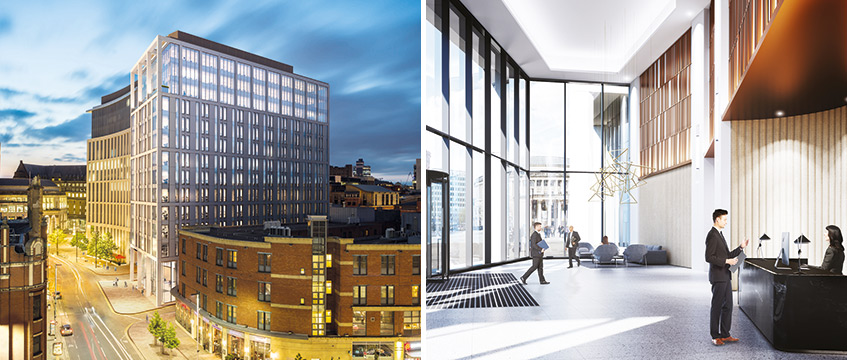Opportunities in London have become a “hard sell”, when compared with the regions, Barings Real Estate has said, following several significant northern deals in the past 18 months.
In an interview with EG, Ian Mayhew, managing director, UK real estate asset management, of the $305bn global financial services firm, said Manchester, where it is developing the 180,000 sq ft Landmark office building, offered opportunities for returns that were no longer available in London.
Acting on behalf of institutional clients looking for returns in the “early-mid teens”, Mayhew said that while London offered a safe haven for low-yielding core assets, there were few options for investors that met Barings’ criteria.
“In London, if you move up the risk curve, either vendors’ aspirations of sale price are just unrealistic, or in order to make it work we as a developer investor would have to reduce the cost of any refurbishment,” he said.
“We are not prepared to do that because you end up with a product that’s only half baked and not right.”
Landmark, which Barings bought from Castlebrooke in early 2017, is one of just two new office developments – alongside Worthington Properties’ 116,000 sq ft 125 Deansgate – scheduled to open in Manchester next year.
With core construction now complete, the development on St Peter’s Square is on track for completion in August 2019.
Mayhew said buying Landmark was an opportunity to move outside the London market to an area with significant demand and a lack of supply. Although Manchester office take-up reached 1.2m sq ft in 2017, grade-A supply stands at less than 200,000 sq ft – roughly half of the average annual grade-A take-up in the city. Neither Landmark nor 125 Deansgate will satisfy continuing demand.
In addition to Landmark, Barings financed Schroder’s acquisition of No 1 Spinningfields with an £81m facility earlier this year – another seal of approval for the Manchester prime office market. It also provided £34.7m of development finance to US firm Atlas Residential and IP Investment Management to buy a £55m waterfront PRS development in MediaCityUK, Salford.
“We are not just dipping in and dipping out,” Mayhew said. “We really do buy into the whole Manchester story.”
The occupier story
One of Manchester’s advantages, Mayhew said, was its diverse occupier base. Employment is underpinned by four universities and the highest graduate retention rate outside London.
On Landmark, Barings is in “detailed discussions” with a number of professional services and tech occupiers – though none has gone under offer – reflecting the growing number of these firms in St Peter’s Square.
“We are the final piece in the jigsaw in the St Peter’s Square renaissance over the past five years.” Mayhew said. “The real CBD has shifted to St Peter’s Square and we are just glad that we are helping with that.”
Since One St Peter’s Square completed in 2014, occupiers such as KPMG, Irwin Mitchell, CBRE and WeWork have moved into offices in the square. Mayhew suggested that trend is forcing others, particularly law firms, to look at Landmark as an opportunity to move to a prime space and retain talent.
“The danger they see is: if they don’t up their game and move to much better premises, if you are a graduate, why would you work for them if you could work for DLA in One St Peter’s Square?”
The Brexit question
After the EU referendum, Barings put its Landmark deal with Castlebrooke on hold for six months. “Nobody had a clue what was going to happen, so we paused,” Mayhew said.
“We were calm about things and we let matters play out for a few months. When we went back to the fundamentals of Manchester and Landmark, they hadn’t changed.”
Mayhew added that institutional investors, though not relaxed, were “comfortable” about investing in the UK, despite concerns over Brexit.
The range of occupiers in Manchester gave it a level of resilience, he said, that allowed it to compete with the capital. “The Manchesters and Birminghams have had to up their game” since the Brexit vote, Mayhew said, adding that these cities had had to invest in every part of the city – from residential to leisure.
“It has to be a holistic approach, and in Manchester we are comfortable with that holistic approach.
“It might be a hard sell if I turned around and said: ‘We are looking at this opportunity in the heart of the city and the only occupier is going to be a financial one.’
“But another ‘Landmark’ that happened to be in one of the other large regional cities could be an easier one to sell up the line.”
In Leeds, Barings recently provided a £42m loan to Brockton Capital on the Pinnacle building, and last year it funded Corestate Capital Holdings’ acquisition of the Royal Liver Building in Liverpool with a £29.7m facility.
However, investors are struggling to find opportunities in Manchester this year because of limited stock. Only a handful of sizeable deals have completed, including Bet365’s purchase of the Zenith office in Spring Gardens for £31.5m.
What’s next for London?
Although Barings previously purchased 40 Gracechurch Street, EC3, Nexus Place, EC4, and 7-10 Waterloo Place, SW1, for the same institutional client it now invests for in Manchester, it has not found deals that match those criteria in recent years.
However, Barings has no intention of leaving London. “We are never not in the market,” Mayhew said. “We are always looking for opportunities.”
To send feedback, e-mail karl.tomusk@egi.co.uk or tweet @ktomusk or @estatesgazette











